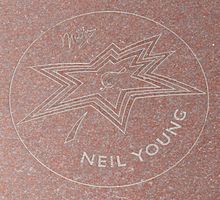The Australian rock group Powderfinger named themselves after Young's song "Powderfinger" from Rust Never Sleeps (1979). The members of the Constantines have occasionally played Neil Young tribute shows under the name Horsey Craze.
Jason Bond, an East Carolina University biologist, discovered a new species of trapdoor spider in 2007 and named it Myrmekiaphila neilyoungi after Young, his favorite singer.
In 2001, Young was awarded the Spirit of Liberty award by the civil liberties group People for the American Way. Young was honored as the MusiCares Person of the Year on January 29, 2010, two nights prior to the 52nd Annual Grammy Awards. He was also nominated for two Grammy Awards: Best Solo Rock Vocal Performance for "Fork in the Road" and Best Boxed or Special Limited Edition Package for Neil Young Archives Vol. 1 (1963–1972). Young won the latter Grammy Award. In 2010, he was ranked No. 26 in Gibson.com's Top 50 Guitarists of All Time.
Other honors include:
- Canadian Music Hall of Fame, 1982
- Rock and Roll Hall of Fame He has been inducted into the Rock and Roll Hall of Fame twice: first in 1995 for his solo work and in 1997 as a member of Buffalo Springfield.
- In 2006, Artist of the Year by the American Music Association.










